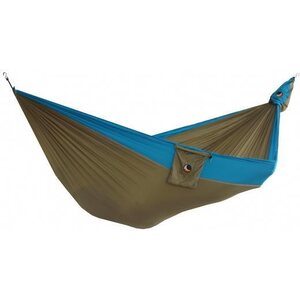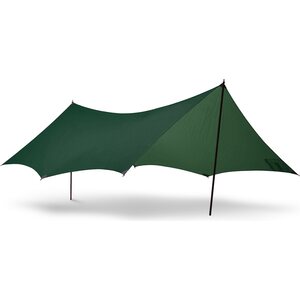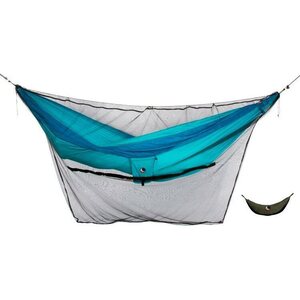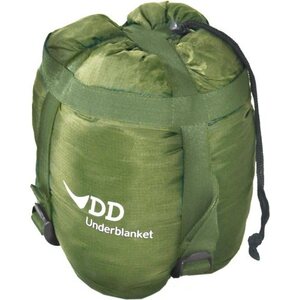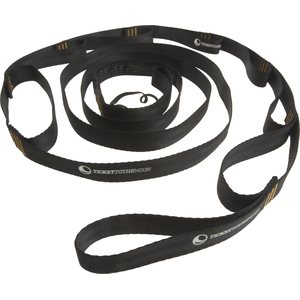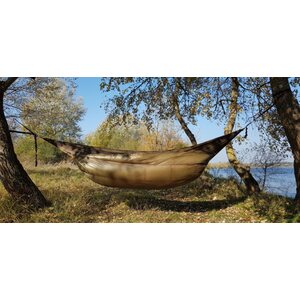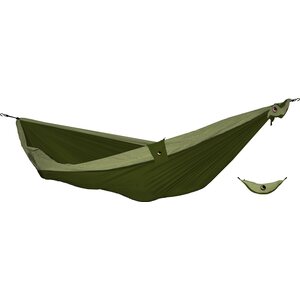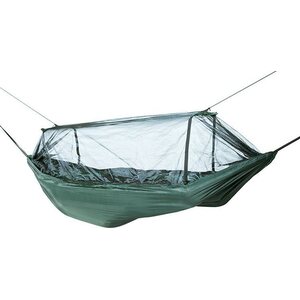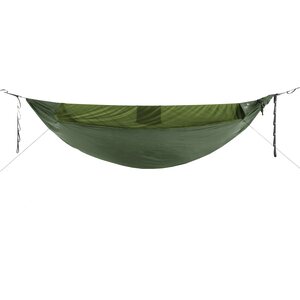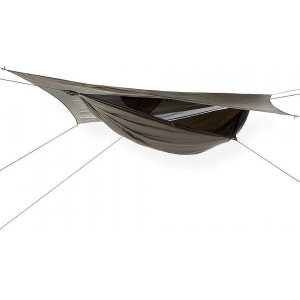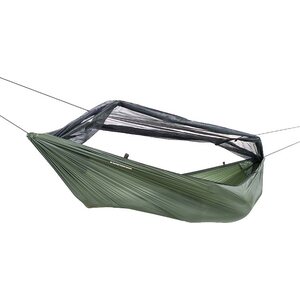A hammock is the perfect companion for nights spent outdoors, whether you're camping in the forest, spending a weekend at the cottage, or just relaxing in the yard. Sleeping in a hammock is not only comfortable but also offers many benefits compared to traditional tent accommodation. This article covers the basics of hammocks, their use, and benefits to make your next night in nature as pleasant as possible.
The benefits of a hammock as an accommodation option
Comfort is always a matter of preference, but many find that lying in a hammock is more comfortable than lying on a sleeping pad. You can make a hammock even more comfortable by setting it up between trees as comfortably and tightly as possible. A better sleeping position also means better sleep, allowing you to hike better.
In camp, a hammock serves as an excellent relaxation and sitting spot during the day. After a few practice runs, setting up a hammock between trees is also very quick, as is taking it down when the journey continues.
A hammock has other advantages as well. A suspended sleeping place is naturally off the cold and possibly damp ground, and the temperature can be adjusted with a sleeping pad or an underquilt installed under the hammock and a blanket or sleeping bag wrapped around the user. This way, you can sleep comfortably in a hammock even in four seasons. You can further improve sleeping comfort by bringing a pillow.
Many hammock models come with a mosquito net, ensuring you can enjoy the outdoors without disturbances. A mosquito net is especially important, for example, on a mosquito-infested summer night in Finland.
Sportsgrene»Udendørs aktiviteter»
Hængekøjer mm.
Sportsgrene»Vandring»Telte og vindbeskyttelse»
Halvtage og pressenninger
Sportsgrene»Udendørs aktiviteter»Myggenet og insektmidler»
Myggenet
Sportsgrene»Udendørs aktiviteter»Hængekøjer mm.»Hængekøjer»Tilbehør»
Underwarmers
Setting up a hammock
The most important thing in setting up a hammock is finding two suitable anchor points, such as trees, with a distance of about three to five meters between them. When setting up the hammock, make sure it hangs at about a 30-degree angle to the horizontal. A hammock that is too tightly strung can be uncomfortable and strain the anchor points.
It is advisable to use adjustable straps (so-called tree straps) or ropes that are easy to tighten or loosen as needed. Remember to check that the trees you use are strong enough to support your weight without the risk of damage. When planning your trip, consider the hammock's requirements for suitable trees – for example, above the tree line in open tundra, it is very difficult to find a suitable place for a hammock. A hammock may also be somewhat uncomfortable in a severe storm or wind.
If there is a chance of rain at night, it is advisable to install a tarp over the hammock to protect the user.
Ideas for using a tarp
Steps to setting up a hammock
-
Find two sturdy trees: Choose two sturdy trees or other anchor points about 3-5 meters apart, with a diameter of at least 15-20 cm. This ensures that the trees can support your weight and the movement of your hammock.
-
Install the straps: Wrap wide straps around the trees about 1.5-2 meters above the ground. The straps should be wrapped around the tree so that they are firmly in place but do not damage the tree. Wide straps are preferable to narrow ropes because they better protect the tree's bark.
-
Attach the hammock with carabiners: Once the straps are in place, attach the hammock to the straps with carabiners. You can adjust the height and tension of the hammock by moving the carabiners to different points on the straps.
-
Adjust the angle of the hammock: The hammock should be set up so that it forms about a 30-degree angle to the horizontal. This reduces the strain on the straps and makes the hammock more comfortable to lie in.
-
Test the height: Sit carefully in the hammock and test its height and comfort. The general recommendation is that the hammock should be about 30-50 cm above the ground. This makes it easy to get in and out of, but it is not too high.
-
Add a tarp and mosquito net if necessary: If the weather looks unstable or there are many insects in the area, hang a tarp over the hammock and install a mosquito net around it. The tarp should be attached so that it extends well over the hammock, protecting you from rain and wind.
Packing list for hammock camping
For a successful hammock camping trip, you need at least the following equipment, specifically for successful hammock accommodation.
-
The hammock itself: When buying a hammock, pay particular attention to its weight and dimensions. Especially larger users should consider two-person models, as they are slightly more spacious but not significantly heavier. However, sleeping in a two-person hammock with two people can be quite cramped, and its comfort should be tested in the backyard first – it is generally wise to bring a separate hammock for each camper.
-
Attachment ropes: Attachment ropes are usually not included in the hammock sales package but are purchased separately. In principle, you can make attachment ropes yourself from, for example, old climbing ropes, but ready-made tree straps are handy.
-
Underquilt: An underquilt installed under the hammock insulates the user's underside from the cold air, especially in cold weather. Instead of an underquilt, you can also use a sleeping pad, but a separate underquilt is often a more comfortable option. You can explore the selection of underquilts here.
-
Rain and pack cover: Optional rain and pack covers allow you to protect the entire hammock setup from rain in camp. When packing, you can wrap the entire hammock setup with attachment ropes into one package, making it even quicker to set up again.
-
Tarp and mosquito net: Some hammocks have an integrated mosquito net, while others can be purchased separately. The tarp should also be purchased separately, and its installation should be practiced before the trip. There are also various packages for sale that include everything from the hammock to the attachment ropes and other accessories in one sales package.
Sportsgrene»Udendørs aktiviteter»Hængekøjer mm.»Hængekøjer»Tilbehør»Underwarmers»
DD Hammocks Underblanket
Kampagnepris 71,01 - 76,41 €
Tilgængelig på lager
☆☆☆☆☆ (336)
Sportsgrene»Udendørs aktiviteter»Hængekøjer mm.»Hængekøjer»Tilbehør»Reb»
Ticket To The Moon Moon Strap
Tilgængelig på lager
☆☆☆☆☆ (232)
Sportsgrene»Udendørs aktiviteter»Hængekøjer mm.»Hængekøjer»Tilbehør»Underwarmers»
Bushmen Underquilt Glow
Kampagnepris 261,99 - 333,99 €
Tilgængelig på lager
☆☆☆☆☆ (52)
»
Sportsgrene»Udendørs aktiviteter»Hængekøjer mm.»Hængekøjer»
Ticket To The Moon Original Hammock
Tilgængelig på lager
☆☆☆☆☆ (76)
Sportsgrene»Vandring»Telte og vindbeskyttelse»Tree Tents and Hammocks»
DD Hammocks Frontline Hammock
Tilgængelig på lager
☆☆☆☆☆ (360)
Sportsgrene»Vandring»Telte og vindbeskyttelse»Tree Tents and Hammocks»
Ticket To The Moon Original Pro Hammock
☆☆☆☆☆ (24)
Sportsgrene»Vandring»Telte og vindbeskyttelse»Tree Tents and Hammocks»
Hennessy Hammock Explorer Deluxe Zip
☆☆☆☆☆ (2)
Sportsgrene»Vandring»Telte og vindbeskyttelse»Tree Tents and Hammocks»
DD Hammocks DD SuperLight Frontline Hammock
☆☆☆☆☆ (56)
Du kunne også være interresseret i
Why are barefoot shoes so popular?
Barefoot shoes have gained great popularity, and for good reason. They offer a natural way to move that respects the structure and function of our bodies. VivoBarefoot shoes are designed to support the natural movement of your feet while providing maximum sensory feedback from th...
Why Merino Wool is a Superior Material Even in Summer?
In collaboration with Devold
Our daily choices affect our future. Devold has been making responsible choices since 1853, opting for natural and sustainable solutions. Merino wool is one of these choices. Few still know that it is the perfect material for summer use, especially fo...
Guide to choosing a Petzl headlamp: find the best model for your needs
Petzl is known for its high-quality headlamps, designed for a variety of activities. With numerous models available, selecting the right one can be overwhelming. To simplify your decision, we have collaborated with Petzl to create an overview of the most popular models at Varuste...
